A neoconservative “theater” that could instead reflects a search for a space of self-assertion and a quest for meaning?

« If some men stay single for a long time even when they want to be part of a couple, it’s because women are generally too superficial and attracted only to men who are physically perfect »
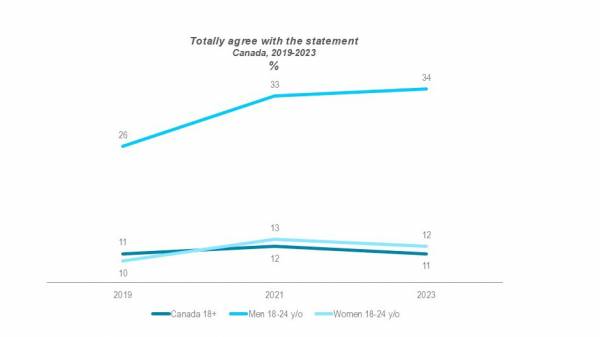
The resounding success of the British mini-series Adolescence, available on Netflix, inspired us to write this piece.
We had data from previous surveys conducted between 2019 and 2023, which could certainly give us an idea of the current state of affairs on this issue across the country (even though the results are two years old, we can assume that the current reality is fairly similar).
Thus, among the Canadian population as a whole, 11% of adults (18 years and older) agree with the statement presented in the introduction—this figure remained stable between 2019 and 2023, the years during which we measured it.
However, after conducting multiple statistical analyses on the results, a very specific segment of the population stood out on this issue, with notably high and even increasing scores between 2019 and 2023: young men aged 18 to 24, the group we focus on in this text.
The following graph provides a detailed overview…
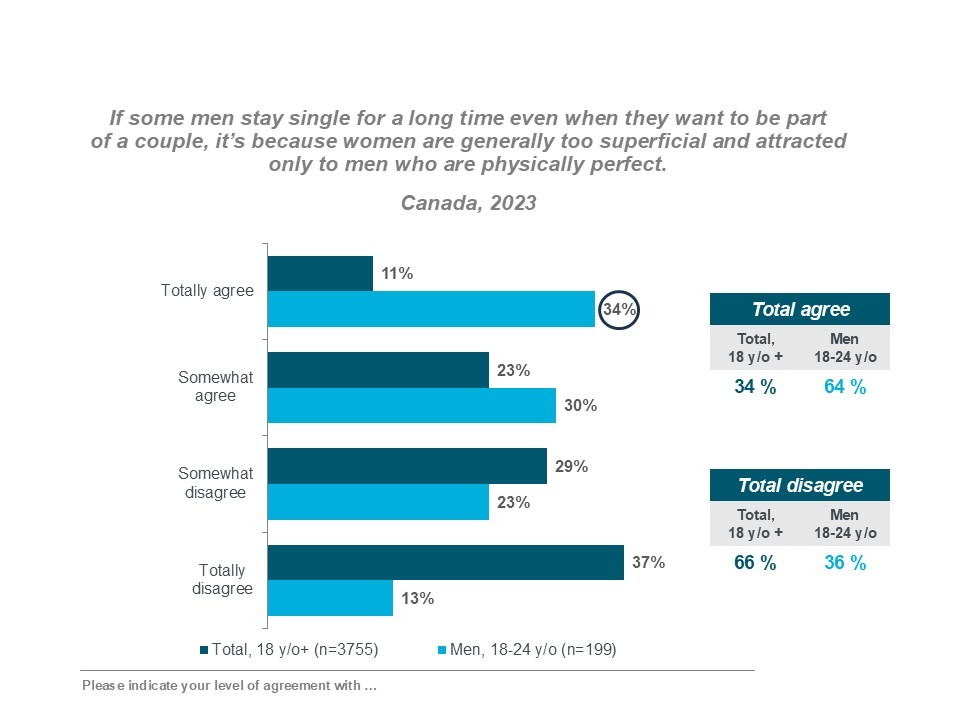
A clear expression of toxic masculinity is revealed through these results. Among some, an exceptionally high proportion aligns with the incel mindset in the country: one in three young men (34%) say they completely agree with the statement!
Social media, male supremacist influencers, and the abundance of toxic content these young men can access can certainly be blamed, but we are inclined to believe that this adherence to the incel mindset cannot be reduced solely to views about women's roles in social relationships (although that is undoubtedly a factor!).
A broader socio-economic and socio-cultural context is certainly at play behind this reality. These young men are growing up in a psychosocial environment that tends to encourage such attitudes toward women.
First, it should be noted that the young men who completely agree with the statement tend to come from less privileged socio-economic backgrounds than the general population.
They have lower incomes and lower levels of education. We find also an over-representation of laborers and blue-collar workers in this group.
Additionally, four major mental postures seem to shape the “socio-psychological toxicity” in which these young men evolve:
1. A sense of social exclusion and a fatalistic view of life,
2. Distrust of institutions and susceptibility to conspiracy theories (a clear sign of frustration), •
3. A need for social validation and recognition,
4. A compensatory reconstruction of identity through masculinist and neo-conservative stances.
A sense of social exclusion
Unfortunately, a significant portion of people in the country struggle to feel “connected” to the world we live in. For some, life is changing too fast. Identity codes and social roles are constantly being reshaped by personal expressions (for some, it raises the question of what it even means to be a man or a woman today—and sadly, they find answers in the traditional stereotypes that are rampant on social media).
In this context, one in two Canadians (47%) agrees with the statement that they don’t really feel connected to what’s going on in society (10% completely agree).
But once again, among young men aged 18 to 24, a striking 67% report feeling “disconnected” (25% completely agree)...…
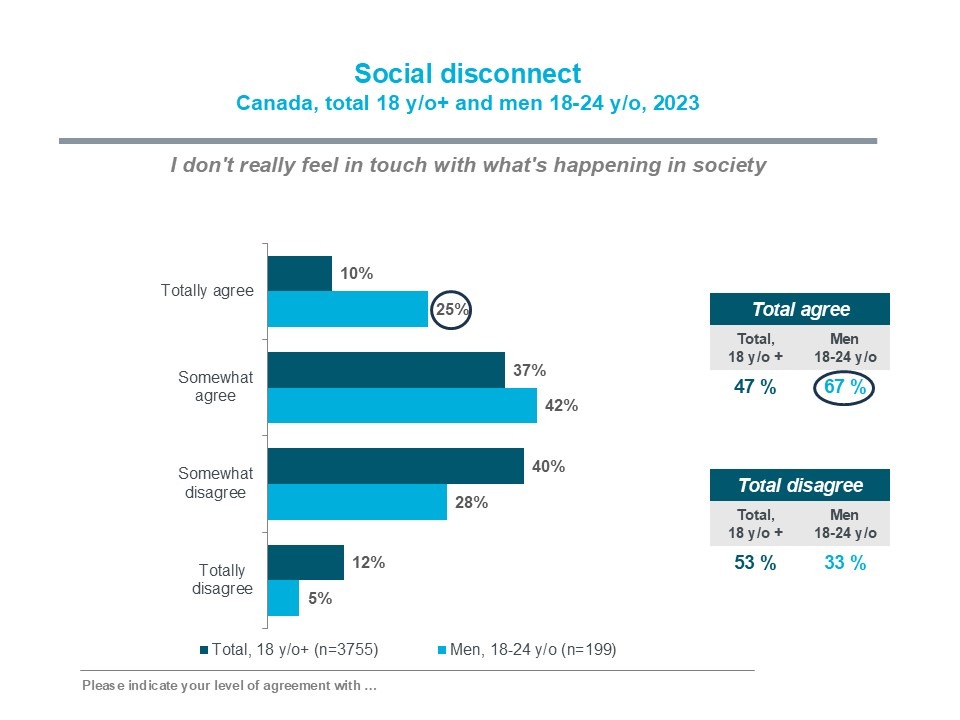
This perception of disconnection fuels a feeling of exclusion, of being rejected by society—as if these individuals had no place in it, as if the legitimacy of their existence were being denied. It’s a sense of being second-class citizens.
This emotional experience ultimately leads them to question the very meaning of their lives, as shown by the following results…
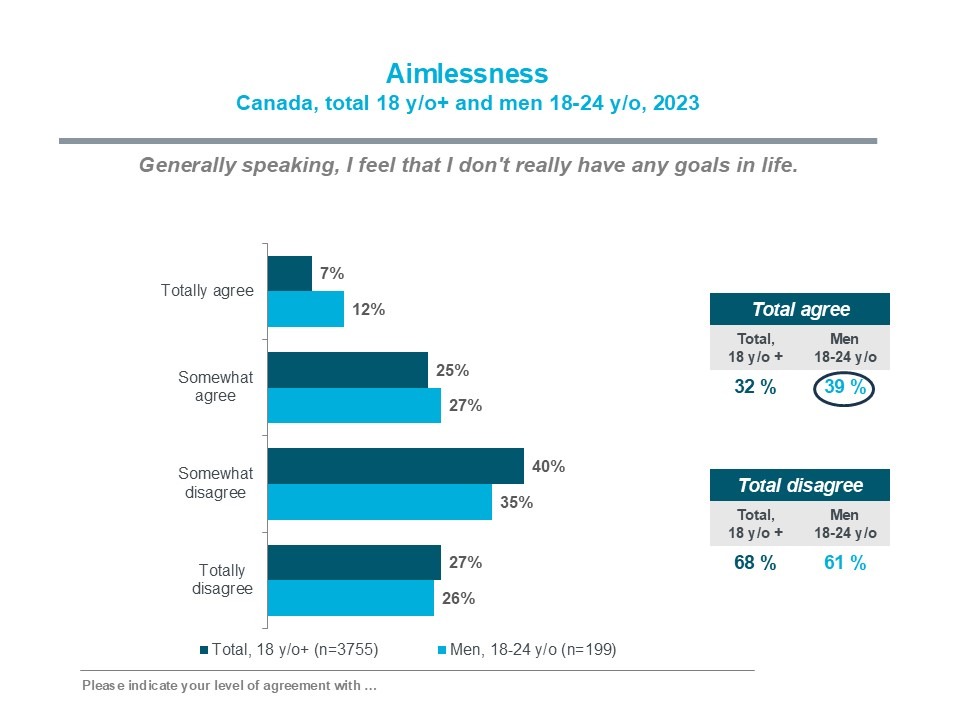
Thus, to the feeling of social marginalization is added a lack of personal direction: a high proportion of young people do not perceive a clear purpose in their lives. This once again seems to reflect confusion in the construction of their identity (which further amplifies their sense of social exclusion).
Furthermore, they also express a fatalistic outlook on the future—a sense of having little control over their own lives, as if external forces are dictating their fate. It’s a fatalistic vision of life in which they feel they have very little free will. As if they were trapped in this undesirable mindset…
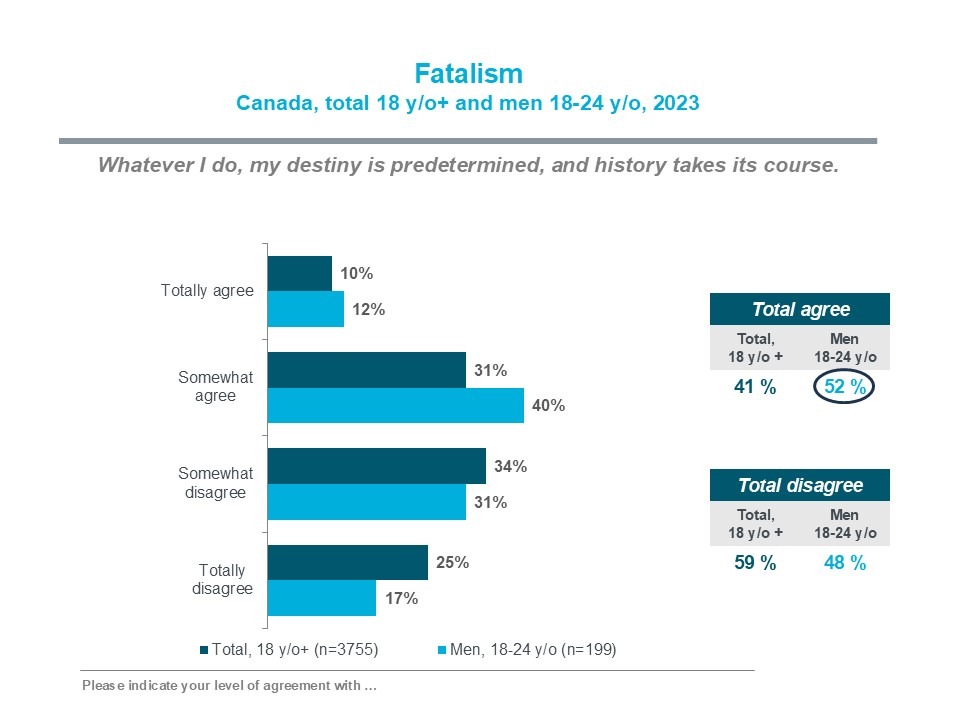
Thus, in light of these findings, there is a clear sense of discomfort among these “incels,” along with a need to reconstruct an identity in which they can feel at ease—an identity capable of asserting some form of legitimacy in the eyes of those around them.
Distrust of institutions and elites, and susceptibility to conspiracy theories
Within this kind of psychosocial isolation these individuals experience, a sort of parallel world begins to take shape. It's as if a paranoid mentality develops—one that makes them particularly susceptible to the conspiracy-laden content they often consume (especially on social media).
For instance, two out of three young people in the country (67%) agree with the following statement…
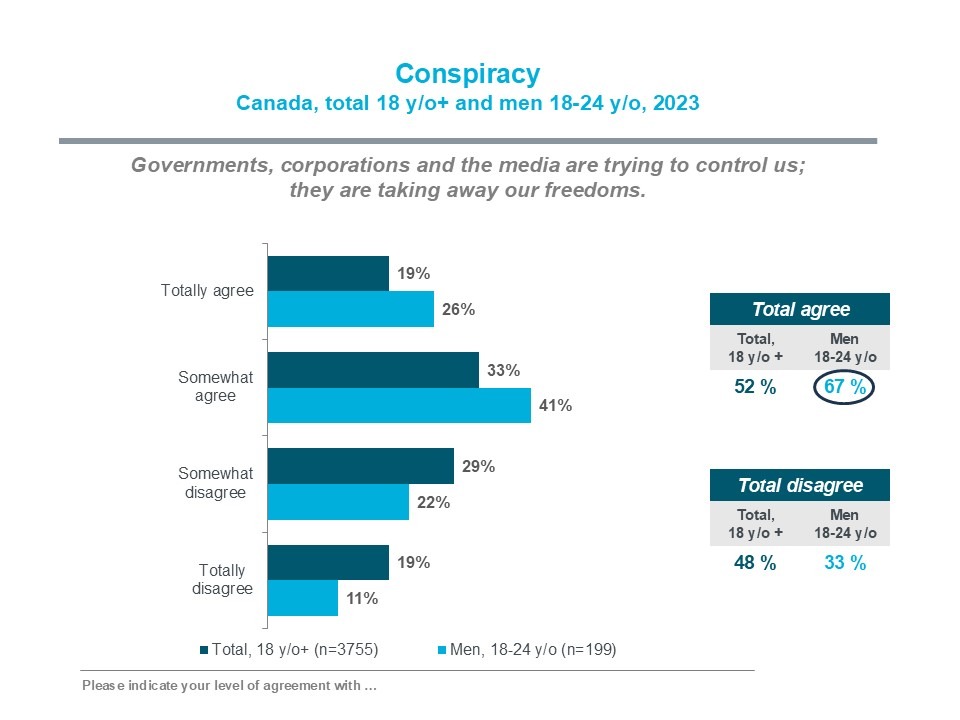
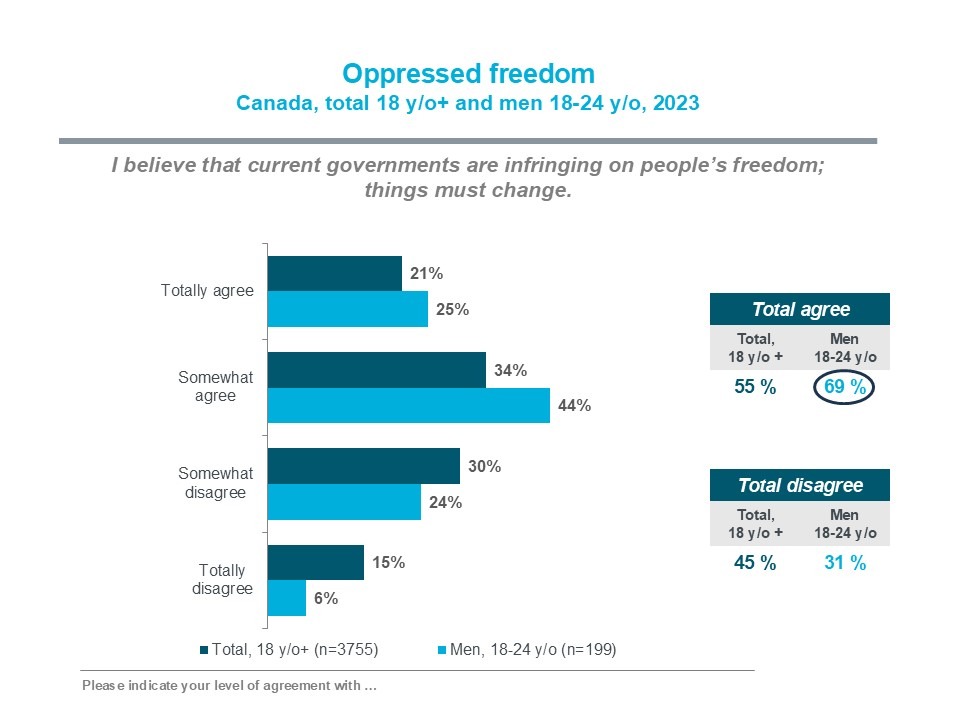
A frustration that can easily find an outlet in civil disobedience—a stance that, in their eyes, grants legitimacy to such actions…
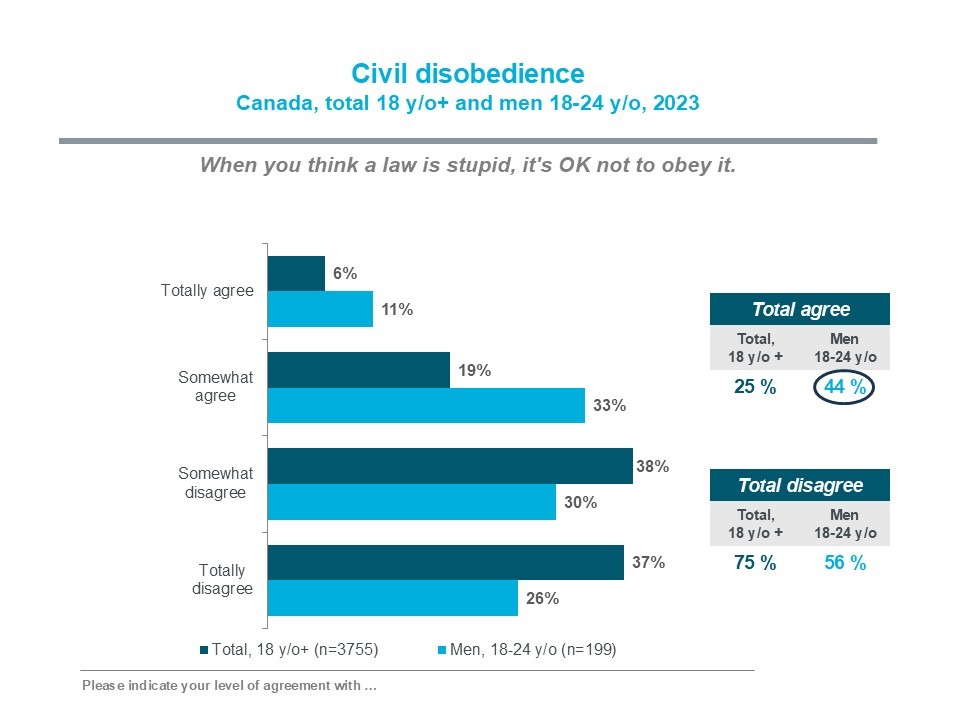
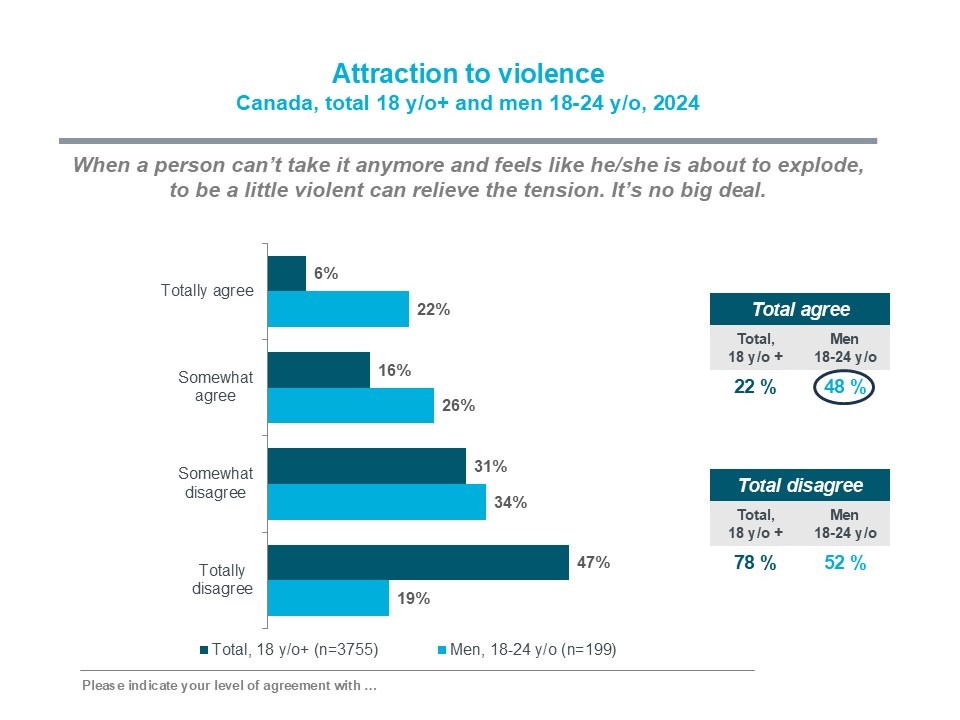
Thus, in general, these results reveal young men in a state of tension—torn between a deep distrust of society and its institutions, a strong desire to break free from their personal constraints, a temptation to rebel against established rules, and a clear tolerance for violence as an outlet.
A generational rupture is strongly expressed through these findings; as if society were in the process of "losing grip" on these young men, as if we were no longer able to bring them into alignment with the common social consensus.
A need for revaluation and social recognition
This suppressed feeling of being second-class citizens is powerfully conveyed through their acute need for social recognition. The following results speak volumes in this regard...
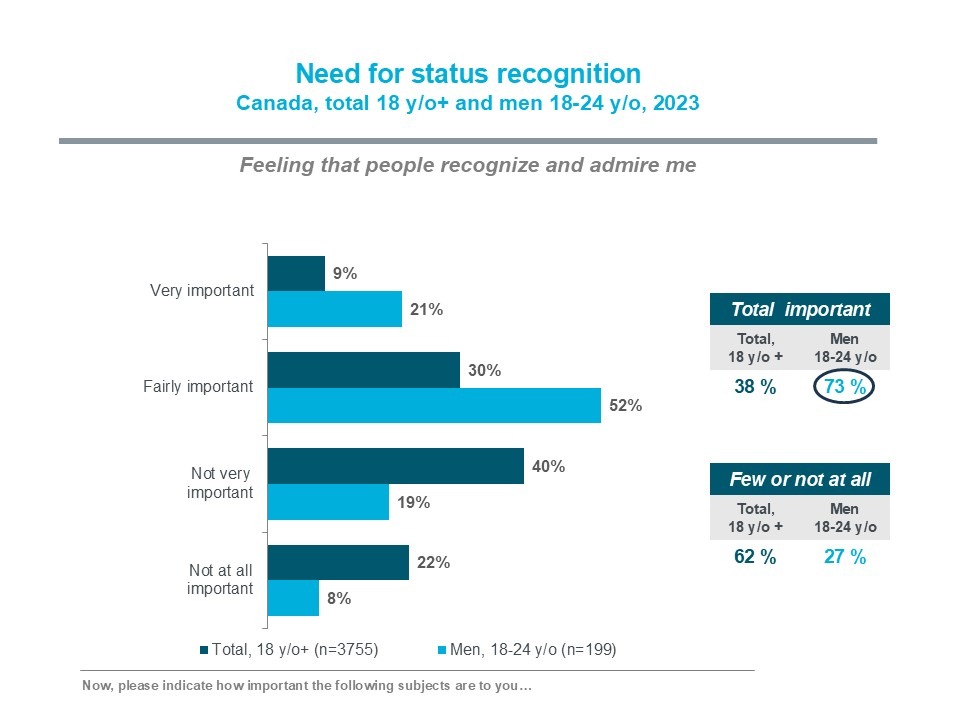
Just like their need to flaunt objects, products, or brands that boost their pride (which they so desperately need)...
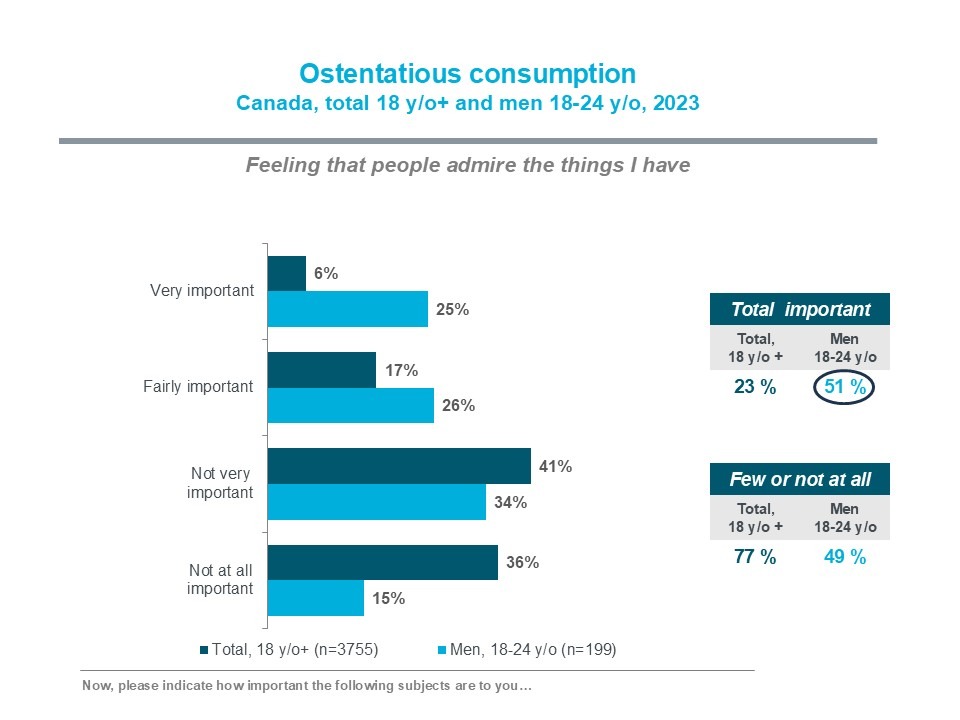
Thus, the very high level of importance that these young men place on being recognized and admired (73% consider it important) highlights a certain vulnerability in their self-esteem when faced with the gaze of others. This quest for recognition is undoubtedly further amplified by the subcultures present on social media.
We truly sense here young men grappling with an identity dilemma. On the one hand, they experience a strong sense of exclusion from society, unsure of what place they might occupy within it. On the other, they exhibit a deep need for social approval and recognition from their peers.
It’s as if there is a tension within themselves: young men rebelling against the existing social framework, yet paradoxically seeking validation within that same framework, or at the very least, from those around them.
A compensatory reconstruction of their identity
This reconstruction appears to take shape through masculinist and neo-conservative stances. These young men seem to be in the midst of searching for identity markers in a world from which they feel excluded.
Their identity dilemma—combined with a loss of trust in institutions and an urgent need for social recognition—seems to push some of them toward clinging to traditional, hierarchical, and gendered models; models that are simpler and less complex to adopt compared to the multidimensional identities found in today’s society.
This neo-conservative retreat is clearly reflected in the responses to the following two questions…
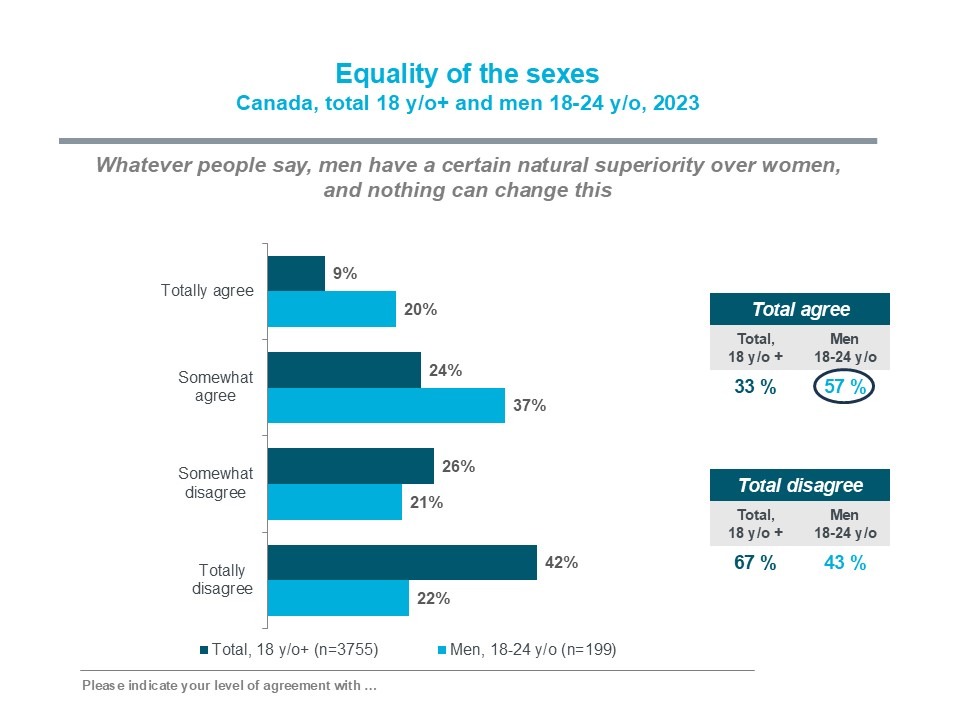
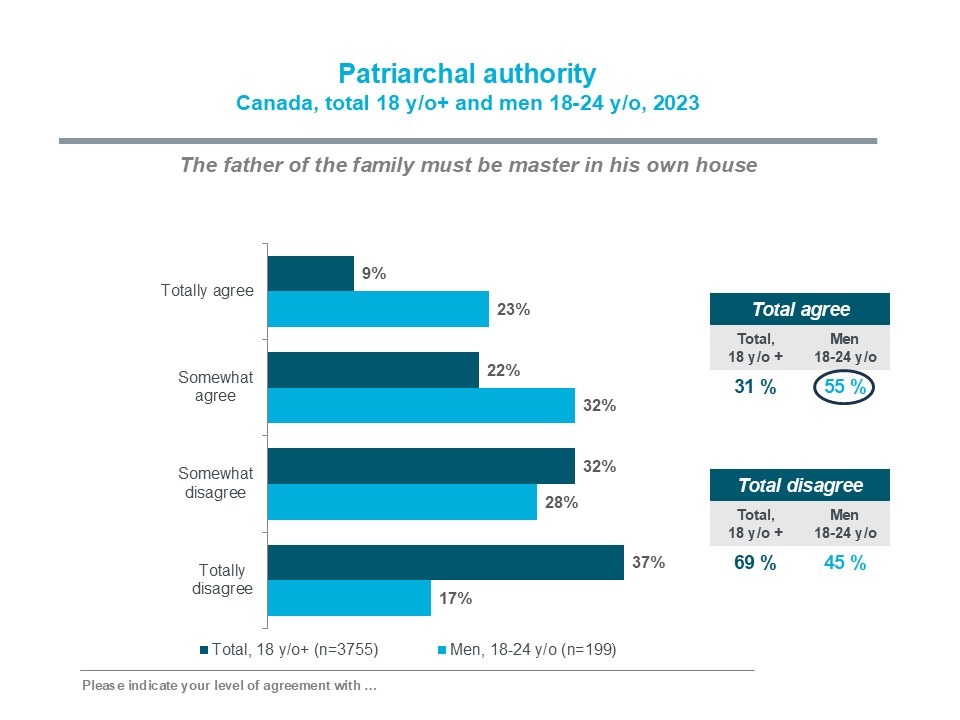
Thus, the fact that 57% of young men in the country agree with the idea that men possess "natural superiorities" over women, and that 55% believe the father should "command" within his family, clearly expresses a need for a compensatory reconstruction of masculinity based on simple and traditional models.
This attitude can be interpreted as an attempt to reassert symbolic power in a world where they otherwise feel powerless and devalued.
It echoes the previously observed need for social recognition: if self-esteem cannot be reinforced through more conventional means (economic success, social inclusion, etc.), falling back on traditional masculine power becomes a way to restore a sense of personal worth.
Still, a Potential for Mobilization!
These results certainly prompt us to ask, “What kind of world are we living in?” and more importantly, “Where are we headed?” (Especially since this portrait appears to intensify among younger age groups—"appears" being the operative word, as we must be cautious given the rapidly shrinking sample sizes when analyzing smaller generational cohorts.)
However, despite this socially off-norm profile when compared to the more modern and consensus-based values embraced by the average Canadian, these young men also express a "brighter side".
They carry within them human, creative potential, and a drive toward self-improvement and personal expression. They are in need of a purpose—or purposes—that could channel and mobilize their energy.
The following results reveal a personal potential just waiting to be harnessed...
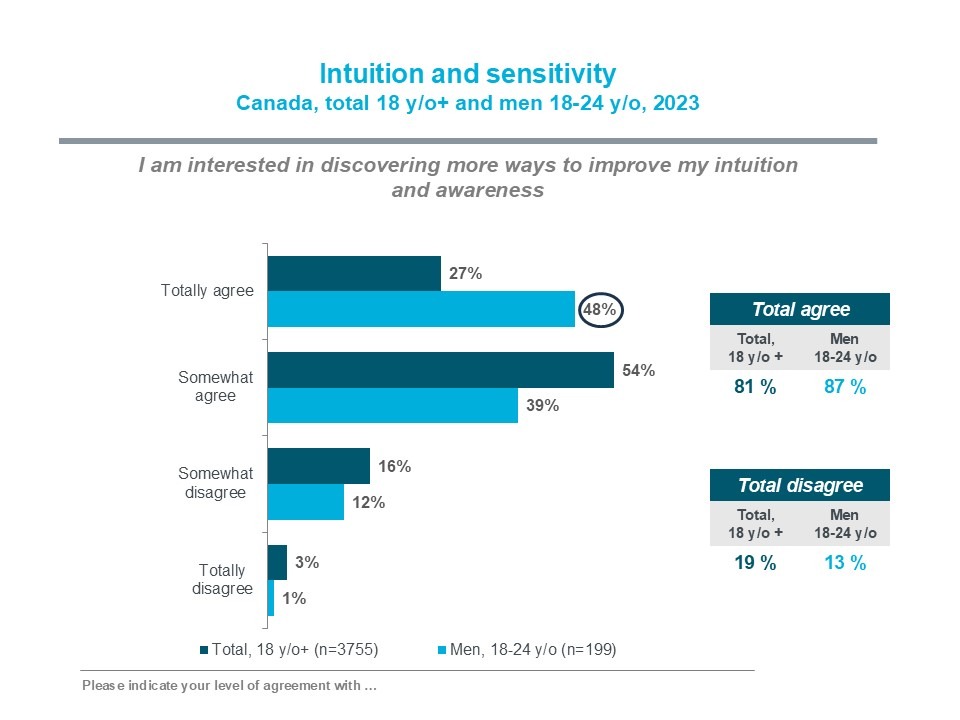
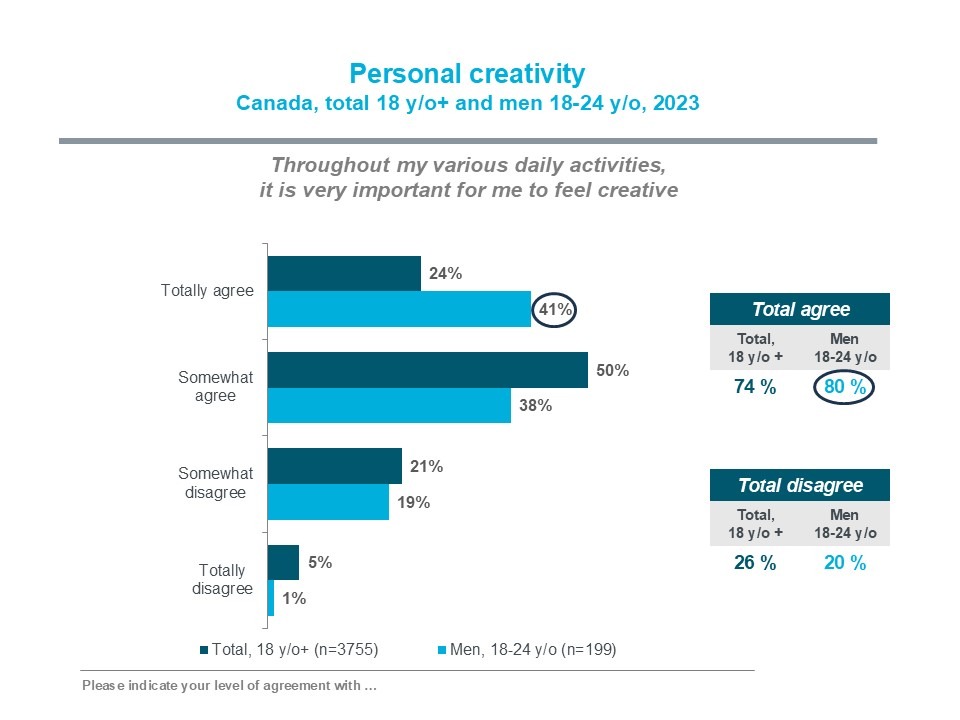
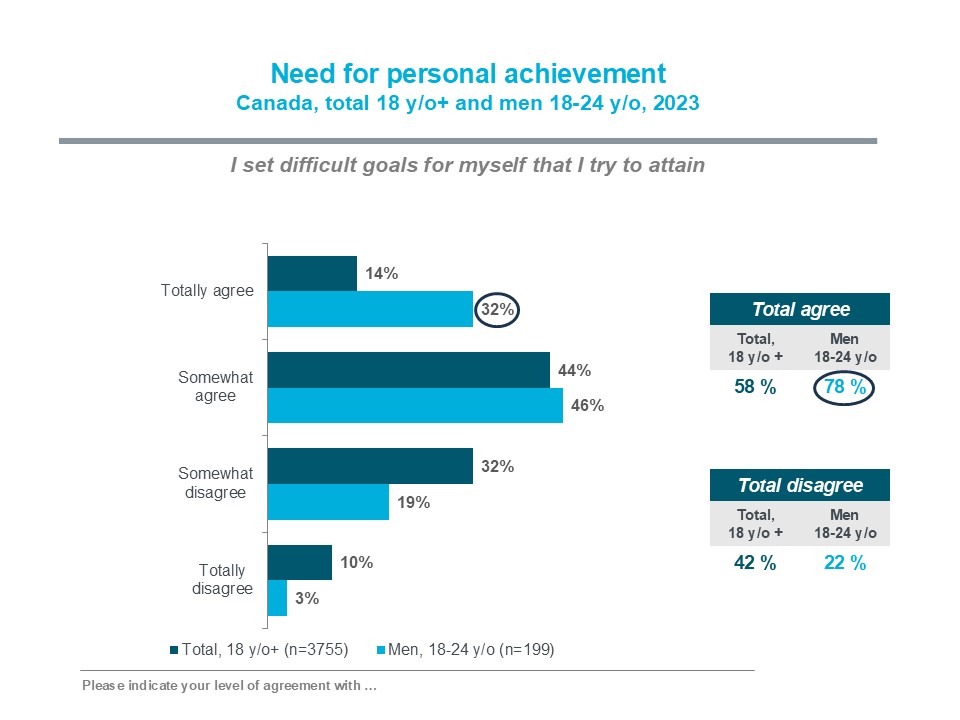
The fact that 87% of these young men say they want to develop their intuition and sensitivity, and that 80% consider creativity to be very important in their daily activities, reflects an underutilized potential just waiting to be mobilized.
These young men are clearly open to alternative forms of self-worth, which could act as levers to help them find their place in society through means other than social or material dominance.
Their strong need for personal challenges (78%) suggests that these young men aspire to push themselves further, to mobilize their inner resources, to do better. This need can be directed toward positive forms of engagement, innovation, entrepreneurship, or social action—provided they are offered the right environments to do so.
They certainly need guidance—to find direction and to channel their energy—but the potential is there.
In fact, one might even suggest that their masculinism, neo-conservatism, fantasies of civil disobedience, and everything else do not only express a kind of social dysfunction, but rather, a cry to find meaning in their life !
This same logic leads us to believe that this "neo-conservative theater" in which they are trapped is actually the expression of a search for a space of affirmation.
This search may adopt the roles and stereotypes of the past, or on the contrary, take more creative, sensitive, and transformative paths.
It all depends on the environment we offer them.
Opportunities for Brands and Institutions
In fact, the society that currently presents itself to today’s youth seems to lack reference points, myths, and role models capable of guiding young men toward more meaningful life paths—especially in the face of the overwhelming presence of toxic masculinity content.
çWe could therefore hope for the emergence of initiatives, projects, and content aimed at young men across the country that promote more modern, inclusive, egalitarian, and emotionally aware masculinities.
There are clear opportunities for brands and institutions here.
We might imagine brands as new identity benchmarks, offering...
• Models of plural, creative, self-actualizing, and emotionally aware masculinity (think of some Gillette’s campaigns, Red Bull’s personal challenge ethos, or Nike apps like Run Club and Training Club that promote self-improvement and community-driven progress).
• Programs or partnerships around mentorship, personal development, and creative expression.
• Campaigns or products that incorporate personalized challenges, gamification, and co-creation.
• Communities or ambassador platforms where young men can showcase their talents, share their stories, and find peer-to-peer validation.
• Initiatives that reward creativity, initiative, and transformation—not just raw performance or purchasing power.
At the Institutional Level
We can also imagine:
• Supporting engagement spaces where these young men can take tangible action: community, artistic, athletic, environmental, or educational projects.
• Offering modern rites of passage: internships, creative challenges, immersive experiences where one learns by confronting oneself—not by competing with others.
• Building alliances between institutions and positive influencers to create credible, embodied, and inspiring alternative narratives.
• Investing in prevention through education, critical thinking, discussion on gender, inclusion, and more.
These are just a few examples of the kinds of initiatives that could counterbalance the social media environment shaping the mindset of many young men in incel-like subcultures—a mindset that urgently needs addressing.
A growing sense of social urgency is palpable here—before scenarios like the one depicted in Adolescence become more frequent, or before the rate of femicide continues to rise across the country.